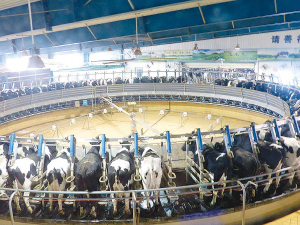Semi-robotic milking technology to boost parlour efficiency
Waikato Milking Systems’ latest innovation, ErgoPOD is now commercially available within New Zealand and Australia.
 There is high demand for reliable, high performing milking technology as China continues to ramp up its herd sizes and milk production.
There is high demand for reliable, high performing milking technology as China continues to ramp up its herd sizes and milk production.
Another New Zealand company has had success exporting dairy technology to China.
Waikato Milking Systems is mid-way through another major project installing four 80-bail Orbit Concrete Rotary parlours for New Hope Animal Husbandry, which has its head office in Chengdu, central China.
The four milking plants will be installed across three farms and collectively they can milk up to 48,000 cows a day.
Each plant has been designed to the same specifications and capable of operating up to 21 hours per day, if required, seven days a week.
Waikato Milking Systems China Manager David Morris says three plants had been installed in 2020, the first was commissioned in July 2020 and the second and third will be commissioned in March 2021.
The fourth will be installed and commissioned late in 2021.
All four plants were designed and made at the Waikato Milking Systems manufacturing plant in Horotiu, north of Hamilton, and exported to China for installation during 2020.
Data compiled by global business data platform Statista show China will have about 6.23 million dairy cows by 2024. It is the fifth largest producer of cow milk in the world, New Zealand is seventh.
Morris says there is high demand for reliable, high performing milking technology as China continued to ramp up its herd sizes and milk production.
All of the plants Waikato Milking Systems exported to China featured heavy duty bail work for handling large numbers of bigger animals, for durability and longevity.
Two of the rotary systems will work side-by-side at New Hope Animal Husbandry’s farm in Ningxia, Northwest of Xian, 1000 kilometres north of Chengdu.
“The farm at Ningxia has about 10,000 animals including dry cows and replacements,” Morris says.
“The farm has two milking herds, each with a maximum of 3000 cows.
“Each of the rotary systems will have throughput of 520 cows/hour, and milking will be three times per day, increasing to four times later on.
“We’re looking at 16 or 21 hours milking time per day.”
The other two Obit rotary plants will be milking cows at New Hope Animal Husbandry’s farms near Jinchang, in the Gansu province, bordering Inner Mongolia to the north of China.
They will operate under a similar programme to the rotary plants at Ningxia, each milking about 520 cows per hour, three times a day moving up to four times a day later on.
“We expect these systems to be operating 16 or 21 hours per day also, depending on how many cows the operator wants to put through.”
Morris says installing the four milking plants had been a challenge because of the extra precautions prompted by Covid-19.
But installation teams in China worked hard and long days to build each of the plants and assemble the components in about three weeks.
“Since 2012 Waikato Milking Systems has installed over 40 cow rotary parlours in China, including 15 which were 80-bail systems and most are now milking four times per day,” David said.
“The market in China is aware of the quality of New Zealand-made dairy products, they know we can make superior milking systems that stand the test of time.”
Fonterra’s impending exit from the Australian dairy industry is a major event but the story doesn’t change too much for farmers.
Expect greater collaboration between Massey University’s school of Agriculture and Environment and Ireland’s leading agriculture university, the University College of Dublin (UCD), in the future.
A partnership between Torere Macadamias Ltd and the Riddet Institute aims to unlock value from macadamia nuts while growing the next generation of Māori agribusiness researchers.
A new partnership between Dairy Women’s Network (DWN) and NZAgbiz aims to make evidence-based calf rearing practices accessible to all farm teams.
Despite some trying circumstances recently, the cherry season looks set to emerge on top of things.
Changed logos on shirts otherwise it will be business as usual when Fonterra’s consumer and related businesses are expected to change hands next month.